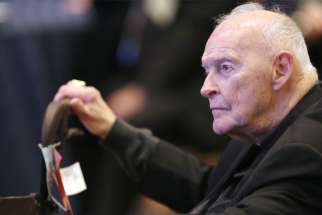Glen Argan: Biden offers U.S. the same old normal
U.S. President Joe Biden is the most publicly religious American president since at least Jimmy Carter. Biden is knowledgeable of Catholic social teaching. He is comfortable talking about his faith, attends Mass weekly and prays his rosary regularly. Yet, the United States Conference of Catholic Bishops (USCCB) is not comfortable with Biden. The reason? He is an unabashed supporter of abortion rights.
McCarrick report expected next week
WASHINGTON -- Vatican officials announced Nov. 6 that the Holy See will release Nov. 10 a long-awaited report on the investigation about the ascent to power of now-disgraced former U.S. Cardinal Theodore E. McCarrick.
Dignity of the human key in all health decisions
TORONTO - What makes a hospital, nursing home or hospice Catholic isn’t the cross in the lobby. It is the decisions made in each and every examination room, operating theatre, boardroom and clinic.
More than 100 Catholic health care institutions in Canada have just received a new guide to help them make those decisions. The third edition of the Catholic Health Alliance of Canada’s Health Ethics Guide has been almost five years in the making and thoroughly updates the 2000 edition.
The Canadian book is fundamentally different from the Ethical and Religious Directives manual produced by the United States Conference of Catholic Bishops, said contributing editor Sr. Nuala Kenny. Rather than a legalistic code of forbidden acts gleaned from Catholic moral theology, the new Health Ethics Guide begins with goals and ideals shared by doctors, nurses, administrators in all Catholic institutions, she said.
“The fact of the matter is that the most important thing for those who are in Catholic health care is their self-identification that health care is not simply a business or a service like any other,” said Kenny. “It is the continuation of the healing and reconciling mission of Jesus Christ. This is a recommitment to that notion.”
The recommitment starts with Scripture. The Health Ethics Guide begins with the parable of the Good Samaritan.
“The Good Samaritan has every element of contemporary health care,” said Kenny. “It has the questions about who is your neighbour? Where are the needs? Today, what are the unmet needs?”
The best part of the Canadian guide is that it isn’t produced by outsiders and then imposed on Catholic health institutions, said Kenny, a retired pediatrician, professor of medicine and professor of medical ethics.
“This is produced by people who are in the trenches,” she said.
The central idea that drives the Health Ethics Guide is the inherent dignity of every human being, said Bishop Noel Simard of Valleyfield, Que. Simard is a former professor of moral theology who served as part of the writing team on the guide.
“It is not because you have the capacity to make decisions that you have dignity,” Simard told a Catholic Health Association of Ontario convention where the new Health Ethics Guide was launched Oct. 11 in Toronto. “It is because you are human.”
If the dignity of the human is central to every decision in health care, then certain conclusions are unavoidable, he said.
“Because we are Catholic and we try to follow the Gospel, we have a duty of special care to the poor, the weak and the vulnerable,” he said.
“We need to look at the common good.”
There’s no big news regarding settled issues from abortion to assisted suicide, said Kenny.
“If you compare this to the previous version, there’s nothing new and groundbreaking in the sense of a new teaching,” she said.
But the guide does offer concrete help to institutions looking to foster a Catholic identity in a situation where not everyone working for the hospital is Catholic and not everyone served by the hospital is Catholic.
The guide bears the Nihil Obstat of the permanent council of the Canadian Conference of Catholic Bishops. It is published by the Catholic Health Alliance of Canada, distributed by Novalis. The 162-page softcover book sells for $20.




